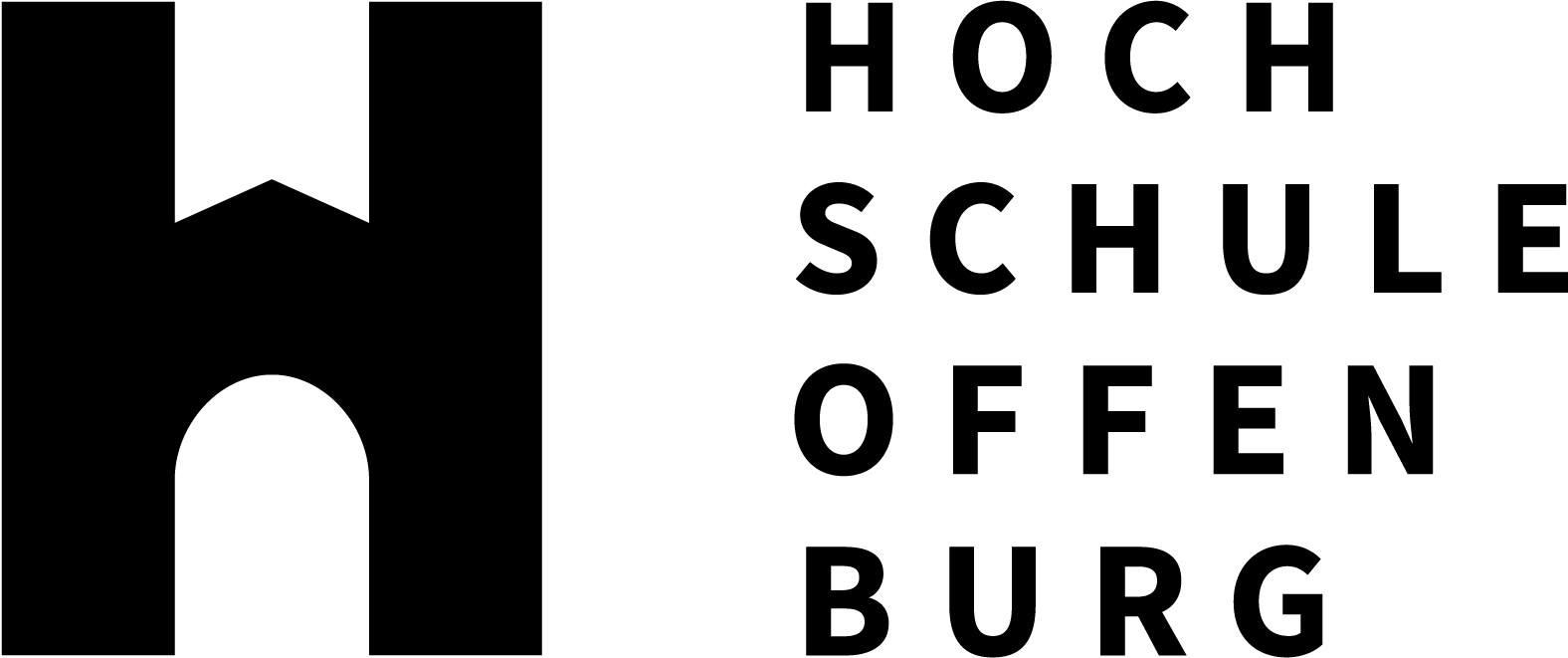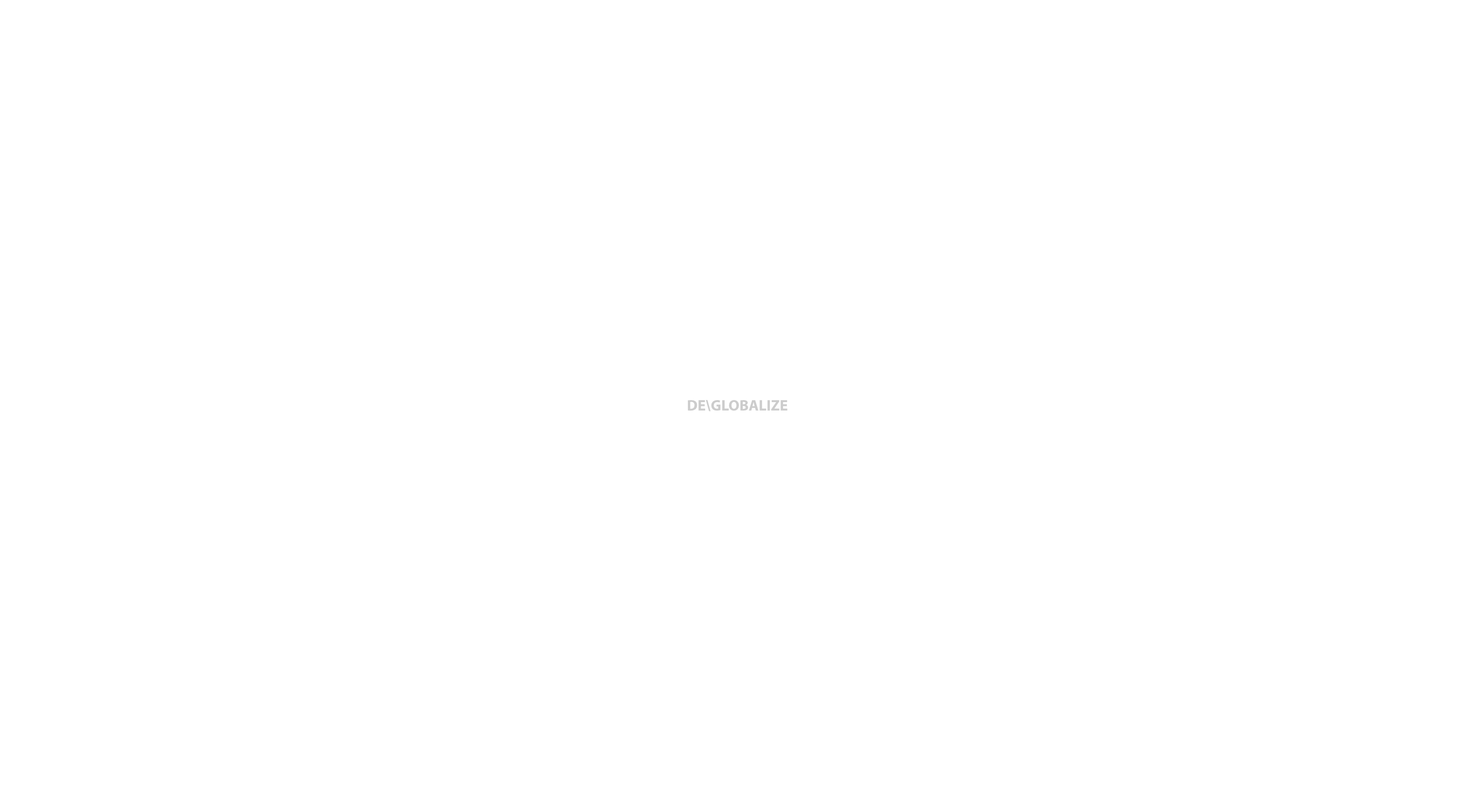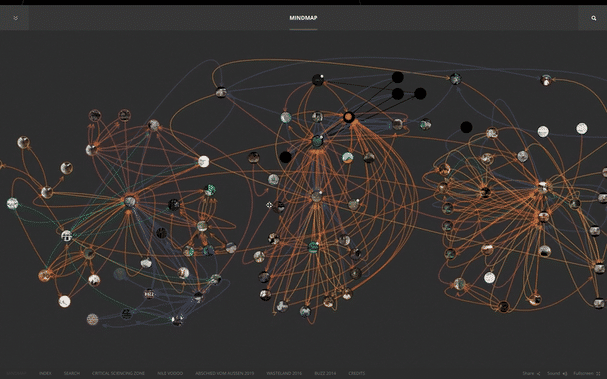The world is a storehouse of matter.
MEDIA-PHILOSOPHICAL RESEARCH
HOW MATTER MATTERS
The artistic research DE\GLOBALIZE travels from matters of fact to matters of care
Since human-made matter has exceeded all living biomass on earth the pointless odyssey of modernity is evident. The false promises of growth with its manifest repressions have lead to unbearable physical and mental tensions within our bodies. The displacement of real land and matter relations has served its time. Instead, tabooed Ghost Acreages emerge in our minds like icebergs while the real ones disperse in front of our technical eyes.
Media practices and theories are radically involved in this collective self-deception. The seductive promise of the Global Village by Marshall McLuhan has to be deconstructed in order to become terrestrial. This is the assignment of DE\GLOBALIZE.
Artistic intervention in the stratosphere
The ethnographic research cycle is a media-philosophical search movement for a new mode of existence. Its Leitmotif is the exploration of the »Critical Zone« – the very thin biofilm around the earth, where our life takes place. In parts the project was developped in cooperation with the French anthropologist Bruno Latour during a two year seminar at HFG Karlsruhe (2018-2020).
The arrangement of the rooms, the organisation of the 'files',
the labyrinth of corridors gives the archive something
of the nature of a temple and a cemetery.
THE ARCHIVE
The here presented open archive invites you to deglobalize the linear narration of growth. It contains a multitude of arbitrary agential cuts and potential media relations through a bunch of critical zones in terms of artistic interventions, interviews and ethnographic documentations.
Within this archive the user can explore this critical zone of the digital by creating own forms of medial co-thinking through which, via which and by means of which the necessary terrestrial turn can be supported. No matter where you start, there is no clear beginning nor a distinct ending. Each click within the archive can be considered as an epistemic opportunity or loss.
Among other preliminary works the archive is based on our artistic research Intercorporeal Splits. According to Helmholtz we were examining »the missing half-second« in the relational zone of the subconscious – in media and within the body. We observed the latency of network connections, polyphonic nodes and artefacts, which are transforming each click into an own »critical zone«. Our conclusions are applied within the interactive documentary of DE\GLOBALIZE. They can be studied in the scientific paper Experimental Polyphony and more deeply in our publication Intercorporeal Splits.
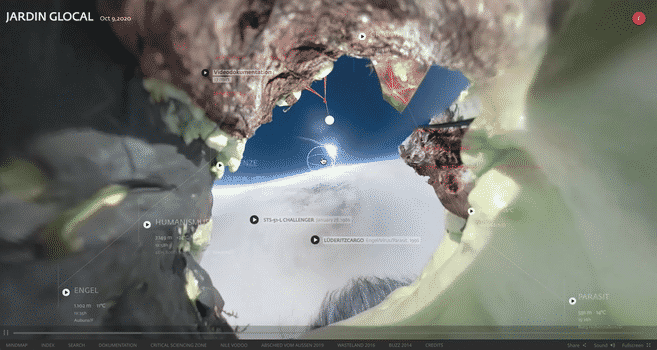
Video tutorial of how to use the Archive
We do not believe in the great whole, nor in the great narrative. That's why we love to work with an infinite and complex network that is fraying at the edge. With all its necessary seductions, confusions and contradictions. In this sense we invite you to our psychogeographical exploration of the anthropocene.
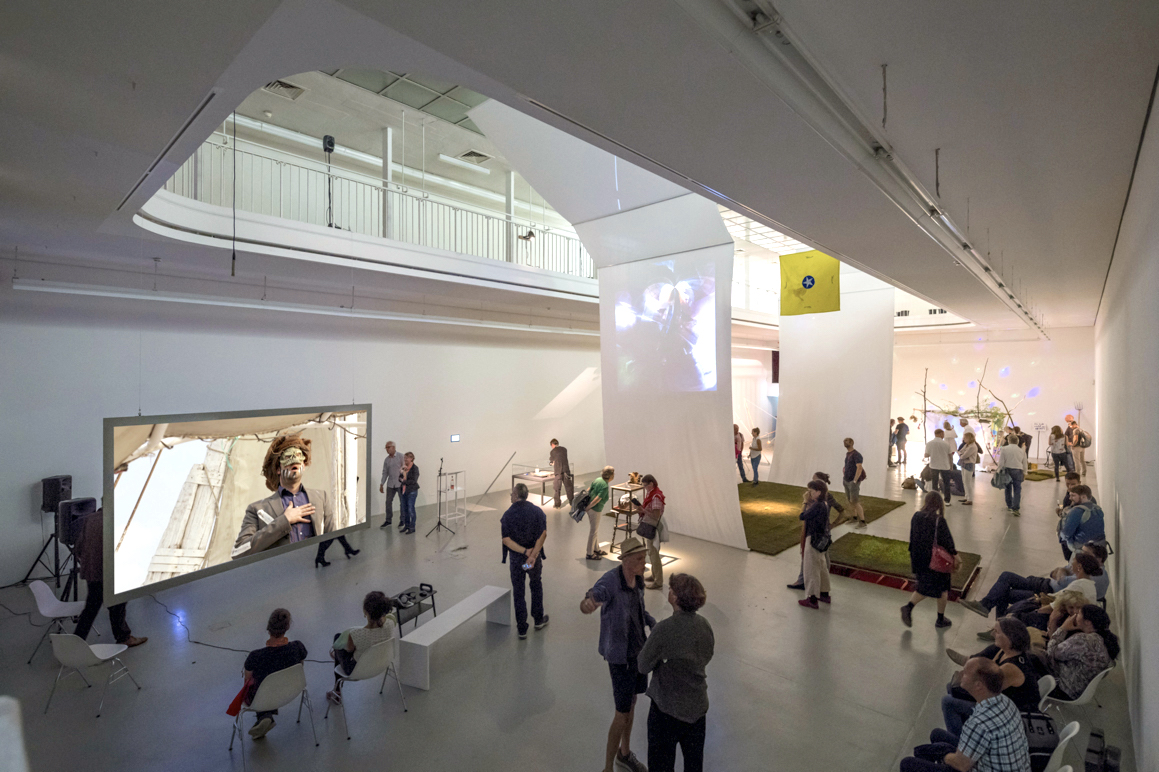
DE\GLOBALIZE was the core of the exhibition ABSCHIED VOM AUSSEN at Kunstverein Freiburg.
It was also part of the exhibition CRITICAL ZONES at ZKM Karlsruhe curated by Bruno Latour and Peter Weibel. The project is actually presented at the Goethe Institutes in India.
Milestones of the research are regularly published as scientific-artistic newspapers.
APPROACH
Four Terrestrial Entry Points
Order is rare, it is an island, a group of islands. Disorder is the ocean from which these islands have emerged. The waves are eroding the coasts.
DE\GLOBALIZE is a digital atlas to browse through media-ecological forays that we undertook in Asia, Africa and Europe. The interactive archive offers agential cuts through four critical zones in science and other sediments.
MATTERS OF FACT | INDIA
Indian Institute of Science, Bangalore
Critical Sciencing Zone
The Indian Institute of Science (IISc) is a cutting-edge research spot in ecological science, engineering and in space industry. It is hosting the main »Critical Zone Observatory« in Asia.
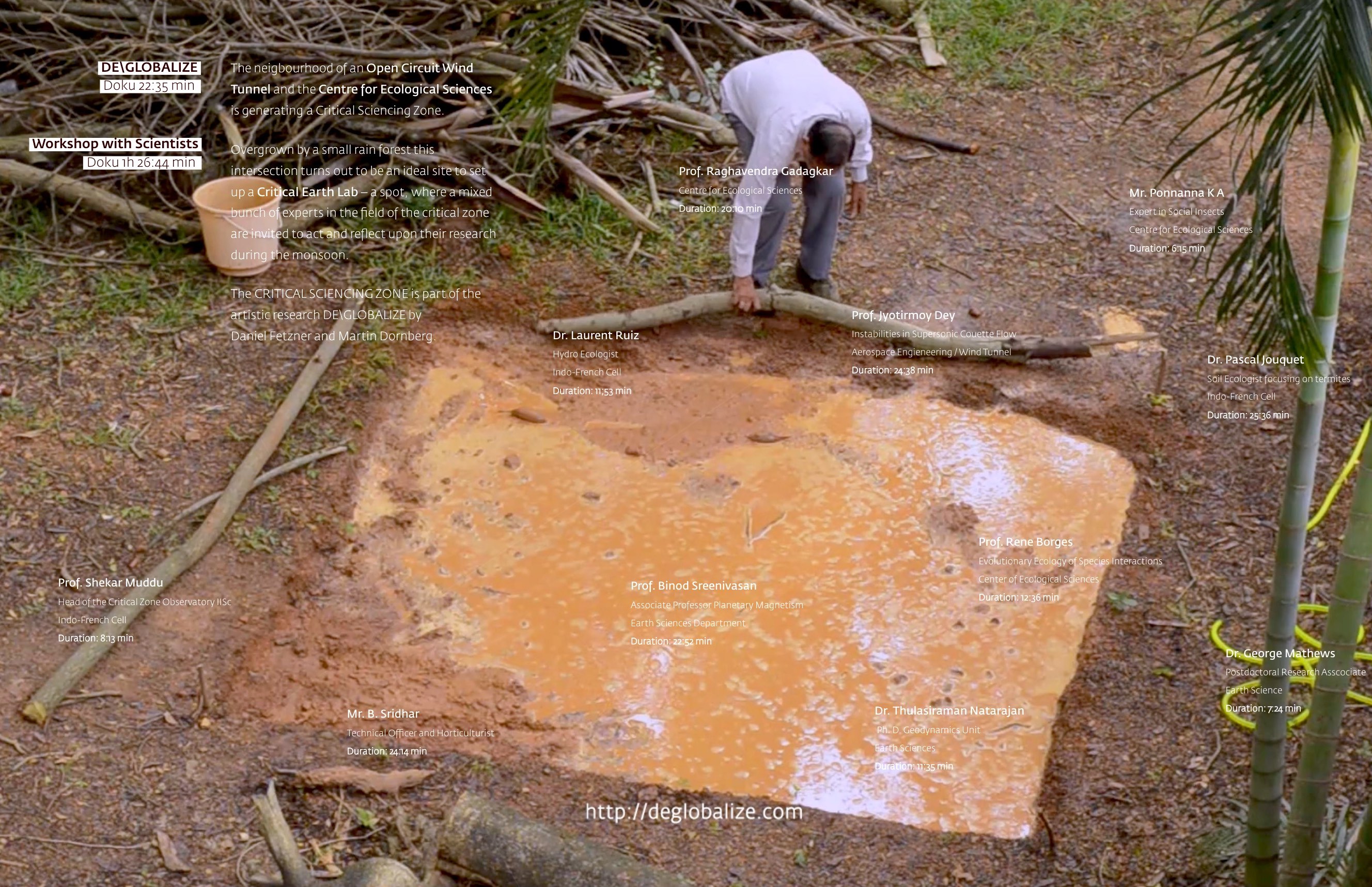
Earth lab at the Indian Institute of Science
In our search movement we use medial, psychoanalytic, performative and hypnotic techniques.
In the random neigbourhood of an Open Circuit Wind Tunnel and the Centre for Ecological Sciences we initiate workshops with scientists, philosophers and artists.
In a small rain forest we set up two spots by 2x2m as earth labs, where we position 11 top scientists of the Critical Zone research in order to discuss their matters of fact – open air during the monsoon.
This collection of ecological knowledge will be applied in our further agential cuts.
MATTERS OF WASTE | EGYPT
Garbage City, Cairo
Critical Matter Zone
The CRITICAL MATTER ZONE in Cairo is focusing on metabolisms of living and dead matter. Around 120,000 people live in Mokattam Village operating an informal waste recycling system for the megacity on the Nile. The Zabbaleen (Arabic زبالين, »rubbish collectors«) sort and recycle about 10,000 tons of waste daily by hand in their homes. We discuss the order of things with the materialistic thinker Graham Harman situated amongst the workers in the noise of the shredding machines.

Performance Nile Vodoo in Cairo
The main protagonist of the CRITICAL MATTER ZONE is water. No life without water as Latour answers on our terrestrial questions. With the help of Samuel Taylor Coleridge we explore this critical matter through the performance Nile Vodoo.
MATTERS OF VIOLENCE | CONGO
Kinshasa and Dungu
Critical Violence Zone
The plundering of the Congo is a crucial part of the anthropocene. The uranium for the first atomic bomb as the rare earths in our smartphones were exploited from Congolese mines.
Our expedition wants to trace inner-psychic splits of care and violence. Thematically we move from science, water and climate to migration, repression and destruction. We travel to a mission station in eastern Congo where traumatised child soldiers live with Augustinian monks.
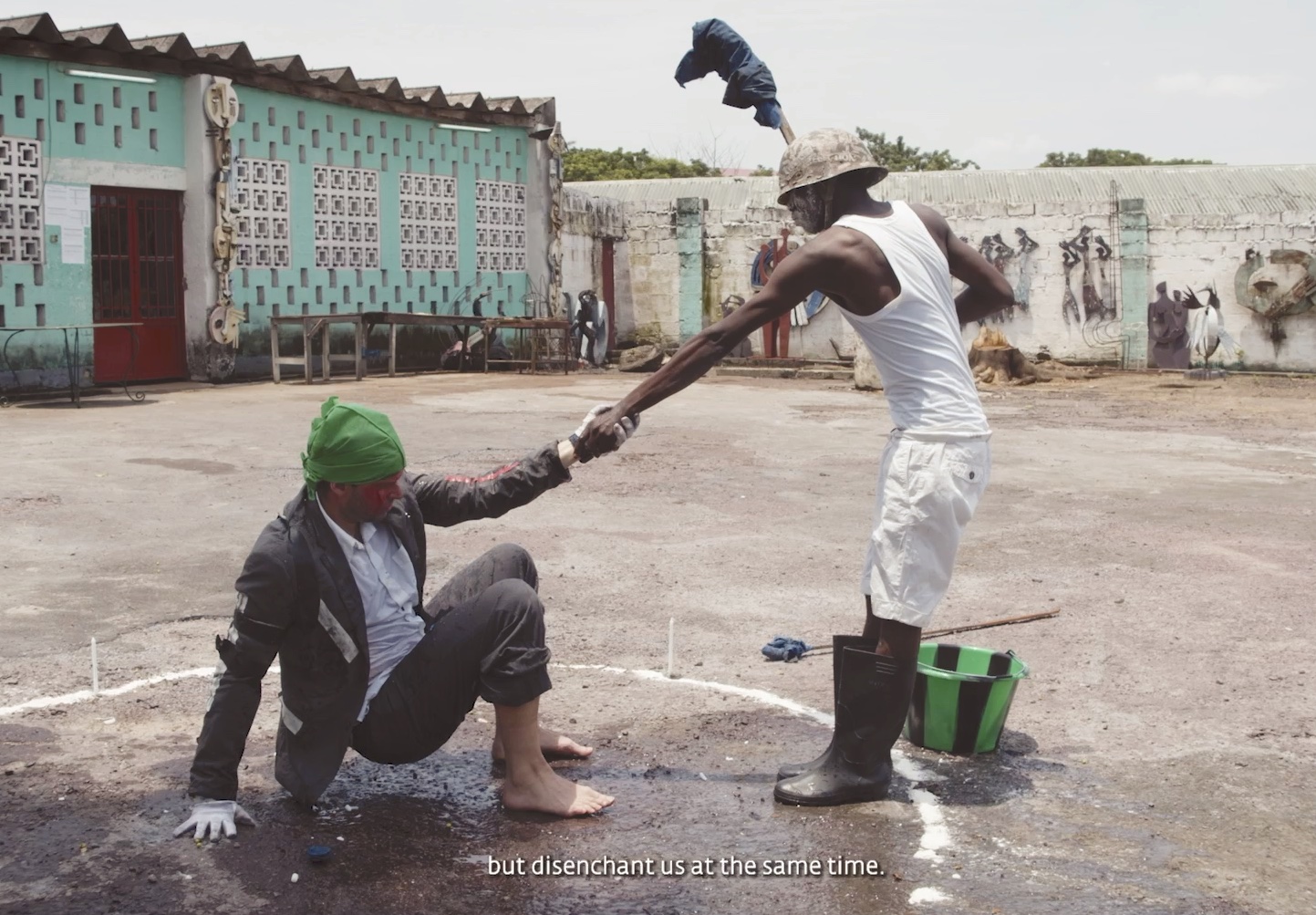
Performance Inner Congo in Kinshasa
We face the fact that the colonial legacy continues to operate in our own bodies, our institutions, economies and media practices. We want to find out where and in which organs it resides.
As disoriented white men, we are following Achille Mbembe's recommendation and use Africa to initiate a thinking of circulation and crossing. The essay film »Inner Congo« is a self-reflection of the ten-day odyssey in form of an correspondance. An expedition into the interior, into the heart of darkness, into repressed violence.
MATTERS OF CARE | RHINE VALLEY
Aubure/Hartheim
Jardin Glocal
In this part of our terrestrial exploration we move from violence to care, from control to bricolage.
Geographically we are returning to the Upper Rhine Valley which is heavily affected by the climate change. We consider this region as JARDIN GLOCAL within the EU research project Climability Care (2019-2025).
DE\GLOBALIZE is asking where to land. With our stratospheric parasite we take the question literally. The topological picture experiments are looking for a zero person perspective. They are based on the assumption that we neither hold all the threads in our hands, nor that they all run towards us. The parasite is also crossing nuclear ruins and blood-soaked battlefields, in which we are still entangled. Mapped by Roma Büro Freiburg.
A special focus will be laid on the communities of Hartheim (DE) and Avonmouth (GB) within the project TETRA (Terrains in Transition). Here we investigate ecological matters of care in two industrialised regions across Germany and the UK that are hotspots for supra-regional energy production.
NEWS
2023, Nov 17-Dec 09 – TERRITORIES OF CARE AND VIOLENCE
Installation and screening of Inner Congo at Kommunales Kino Freiburg. Symposium at Freiburg University.
We need to take care of all bodies as a form of resistance: the waters, the lands and our emotional and psychological states.
TEAM INDIA (2014-2019)
• Dr. Vasanthi Mariadass, Srishti Institute of Art, Design and Technology
• Prof. Raghavendra Gadagkar, Centre for Ecological Sciences at IISc
• Dr. Souvik Mandal Biologist. CES at IISc
• Prof. Rene Borges, Evolutionary Ecology of Species Interactions
• Dr. Pascal Jouquet, Soil Ecologist, Indo-French Cell
• Prof. Binod Sreenivasan, Earth Sciences Department
• Dr. George Mathews, Research Asscociate, Earth Science
• Dr. Thulasiraman Natarajan, Geodynamics Unit, Earth Sciences
• Mr. B. Sridhar, Technical Officer and Horticulturist
• Dr. Laurent Ruiz, Hydro Ecologist, Indo-French Cell
• Dr. Anindita Brahma Biologist. CES at IISc
• Ponanna K A., Biologist, Centre for Ecological Sciences
• Prof. Sekhar Muddu, Head of the Kabini Critical Zone Observatory
• Dr. Laurent Ruiz, Hydrologist. IFCWS, Indo-French Cell
TEAM EGYPT (2016-2019)
• Wolfgang Klüppel, Performance
• Maxime Merkel,
• Lukas Mehl
• Max Peter Grummel
• Katrin Phyllis Schneider
• Prof. Cornelia Redecker, German University Cairo
• Sara Elias
• Mariam Elmahdy
• Mona Diab
• Lamiaa Khaled Diab
• Amina Ahmed Shafiq
• Tasneem Abd El Hamid Ali
• Rana Hossam Allam
TEAM CONGO (2022)
• Wolfgang Klüppel, Performance
• Prof. Henri Kalama, Académie des Beaux Arts, Kinshasa
• Ursula Kölbel, Misereor
• Jean Bosco, Misereor Dungu
• Père Michel, Monastery Dungu
• Frère Blaise, Monastery Dungu
TEAM UPPER RHINE VALLEY (2019-2025)
• Janna Häcker
• Benjamin Schnitzer
• Prof. Florence Rudolph, Soziologin, INSA Strasbourg
• Prof. Rüdiger Glaser, Geograph, Universität Freiburg
• Prof. Marie-Claire Pierrot, Université Strasbourg
• Sophie Roy, Météo France
• Louis Leininger
• Stefan Salm
• Felix Goral
• Arvin Nesselhauf
• Anton Karwath
